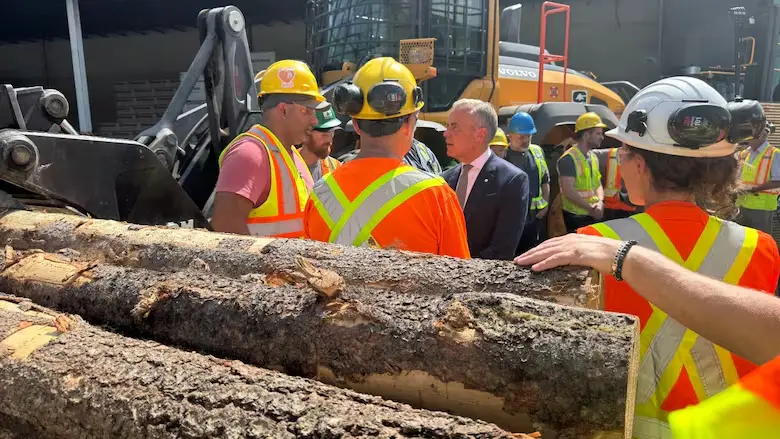Latest News
Latest Ads
-
Jasmine Jewel
Call
-
Omidan group
Call
-
Amir Madanpour
Call
-
Dimo studio
Call
-
Yorkacademy
Call
-
Maryambagheri
Call
-
Shishlix Restaurant
Call

U.S. increases duties on Canadian softwood lumber, bringing total to more than 35%
U.S. increases retaliatory tariffs on Canadian softwood lumber, bringing total to more than 35 percent
B.C.’s natural resources minister calls move “foolish and reckless”
A lumberyard
Premier Mark Carney meets with lumber mill workers in West Kelowna, B.C., on Aug. 5, 2025, after announcing support for Canada’s lumber industry
The U.S. Commerce Department announced Friday that it has increased retaliatory tariffs on Canadian softwood lumber to 35.19 percent.
While the tariff increase was expected, it still drew sharp reactions and swift criticism from industry and political leaders in B.C. and Ontario, who see the move as another example of unfair behavior by the United States, Canada’s largest and most important trading partner.
“Two words describe Donald Trump’s new retaliatory tariffs on Canadian softwood lumber: stupid and reckless,” British Columbia’s Natural Resources Minister Ravi Parmar said in a statement on social media.
“Raising these tariffs will only worsen the price crisis on both sides of the border,” he added.
“These tariffs are an attack on the hardworking workers in Canada’s lumber industry,” Parmar told CBC. He stressed that it is really American consumers who are paying these tariffs, those who are planning to build homes.
“This is a self-serving act; it will hit them hard because they are so dependent on our lumber.”
The British Columbia Forestry Industry Council called the new tariffs “crippling” for Canadian workers, and the British Columbia Lumber Trade Council noted that the tariffs would raise prices for U.S. construction companies that rely on imported softwood lumber to build new homes.
“This decision will hurt communities on both sides of the border,” said the trade council’s president, Carter Nikiwoodt. “What’s needed now is a negotiated, sustainable agreement that supports jobs, businesses and housing affordability.”
The Ontario Forestry Industry Association echoed that sentiment, citing a report by the Canadian Chamber of Commerce that found the tariffs have already increased the cost of building a single-family home in the United States by as much as $6,000.
The softwood lumber issue has been a long-standing point of contention between Canada and the United States, dating back to before the current U.S. administration.
In Canada, timber-producing provinces set fees called “stampages” for harvesting timber from public lands, a system that American producers, who are forced to pay market prices, see as an unfair subsidy.
The U.S. Department of Commerce has also accepted this, imposing tariffs that reflect the belief that Canadian products are being exported to the United States at less than their true value.
British Columbia’s natural resources minister said Canada has always challenged these tariffs under the Canada-United States-Mexico Trade Agreement (CUSMA), the North American Free Trade Agreement and the U.S. Court of International Trade.
“We’ve won every time, but the problem this time is we have a president who doesn’t believe in the rule of law,” he said.
Tariff increases over the past decade have put Canada’s lumber industry under severe pressure, particularly in British Columbia, where hundreds of jobs have been lost as mills have closed or scaled back, in part due to limited access to U.S. markets.
Earlier this week, Prime Minister Mark Carney announced new support for the industry, including more than $1.2 billion in funding to diversify markets and retrain affected workers.
Parmar said he expects about half of that amount to go to British Columbia.
“We are the largest lumber-producing province in Canada, and I expect the federal government to understand that,” he said.
He added that the budget would provide “some respite” from the impact of the tariffs, but stressed that reliance on the U.S. market must be reduced.
Source
Suggested Content
Latest Blog
Login first to rate.
Express your opinion
Login first to submit a comment.
No comments yet.


































